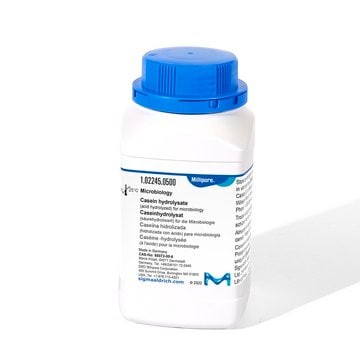C7290
N-Z-Amine® A
suitable for plant cell culture
Synonym(s):
Peptone from casein
Sign Into View Organizational & Contract Pricing
All Photos(3)
About This Item
Recommended Products
form
powder
Quality Level
nitrogen analysis
~6.5% amino, ~13.1% total
technique(s)
cell culture | plant: suitable
application(s)
agriculture
Looking for similar products? Visit Product Comparison Guide
General description
N-Z-Amine A is a peptone containing amino acids and peptides derived by the enzymatic hydrolysis of casein protein. N-Z-Amine A may be used as a plant media growth supplement and in microbiological work.
Application
N-Z-Amine® A has been used:
- as a component in MS media add this for in in vitro shoot multiplication
- as a component in MS media add this for callus induction
- as a component in N6-basal medium for immature zygotic embryos culturing
Legal Information
N-Z-Amine is a registered trademark of Kerry Group
Storage Class Code
11 - Combustible Solids
WGK
WGK 3
Flash Point(F)
Not applicable
Flash Point(C)
Not applicable
Personal Protective Equipment
dust mask type N95 (US), Eyeshields, Gloves
Certificates of Analysis (COA)
Search for Certificates of Analysis (COA) by entering the products Lot/Batch Number. Lot and Batch Numbers can be found on a product’s label following the words ‘Lot’ or ‘Batch’.
Already Own This Product?
Find documentation for the products that you have recently purchased in the Document Library.
Customers Also Viewed
G Platas et al.
Microbiologia (Madrid, Spain), 12(1), 75-84 (1996-03-01)
The optimal conditions for the production of the halocin H1, a 31 kDa bacteriocin-like molecule produced by the extreme halophilic Archaea Haloferax mediterranei Xia3 active against Gram-negative haloarchaea, was characterized. The physico-chemical conditions required for the optimal production of halocin
K Oguma et al.
Infection and immunity, 14(3), 597-602 (1976-09-01)
Five toxigenic strains of Clostridium botulinum types C and D were incubated at 37 degrees C for 7 days in 15 ml of the following media: LYG medium, cooked-meat medium, egg meat medium, and N-Z-amine medium. The supernatants of these
In vitro propagation of northern red oak (Quercus rubra L.)
Vengadesan G and Pijut PM
In Vitro Cellular & Developmental Biology, 45(4), 474-482 (2009)
Zhan Wu Dai et al.
Journal of experimental botany, 65(16), 4665-4677 (2014-01-31)
Grape berry development and ripening are under complex regulation by the nutrients, hormones, and environment cues sensed by the berry. However, the biochemical and molecular mechanisms underlying these types of regulation are poorly understood. A simplified but realistic model system
Induction of callus and somatic embryogenesis from cotyledon and leaf explants of Yeheb (Cordeauxia edulis Hemsl)
Seyoum Y, et al.
Agriculture, Forestry and Fisheries, 3(6), 464-468 (2014)
Our team of scientists has experience in all areas of research including Life Science, Material Science, Chemical Synthesis, Chromatography, Analytical and many others.
Contact Technical Service














